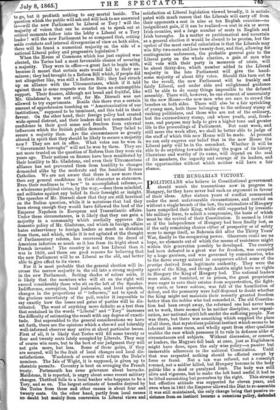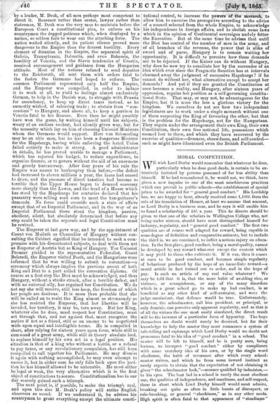THE HUNGARIAN VICTORY.
POLITICIANS who believe in Constitutional government should watch the transactions now in progress in Hungary, for they have never had such an argument in favour of their ideas. After sixteen years of conflict commenced under the most unfavourable circumstances, and carried on without a single breach of the law, the nationalists of Hungary have compelled their King, while still supported by irresisti- ble military force, to solicit a compromise, the basis of which must be the revival of their Constitution. It seemed in 184g as if the independence of Hungary had been finally lost, as if the only remaining chance either of prosperity or of safety were to merge itself, as Bohemia did after the Thirty Years' War, finally in the conquering power. Observers could see no hope, no elements out of which the means of resistance might within this generation possibly be developed. The country had been defeated in a great war for freedom, was occupied by a huge garrison, and was governed by commissaries, who to the fierce energy natural in conquerors added some of the prestige derived from legitimate authority. They were the agents of the King, and though Austria might have no rights in Hungary the King of Hungary had. The national leaders were slain, or banished, or in prison, the great proprietors were eager to save their estates from sequestration, the fight- ing caste, or lower noblesse, was full of the humiliation of defeat, and the peasantry were half disposed to doubt whether the King might not maintain their recently granted freedom better than the nobles who had conceded it. The old Constitu- tion had been swept away, the reformed one had never been set to work, there seemed to be neither discipline, nor organi- zation, nor national spirit left amidst the suffering people. Nor was there, but there was something which supplied the place of all three, that mysterious political instinct which seems to be inherent in some races, and wholly apart from other qualities enables the race which possesses it to rule in defiance alike of circumstances and subjects. Without discussion, or concert, or leaders, the Magyars fell back at once, just as Englishmen might have done, upon the only wise policy—a passive but immovable adherence to the national Constitution. Until , that was respected nothing should be effected except by force or fraud. Not a tax was refused, not a conscript rescued, not a soldier killed, but Hungary became in the body politic like a dead or paralyzed limb. The body was still alive and vigorous, but to make the left hand useful it had to be lifted unresisting but powerless by the right. This strange but effective attitude was supported for eleven years, and even when in 1861 the Emperor allowed the Diet to re-assemble it was still maintained, the only change being that passive re- sistance from an instinct became a conscious policy, defended y a leader, M. Beak, of all men perhaps most competent to direct it. Reasoner rather than orator, lawyer rather than statesman, M. Beak was the very man to maintain before the European Court a constitutional plea, to enforce on his countrymen the dogged patience which, when displayed by a nation, so seldom fails to wear out the attacking force. The nation waited silently, and its patient silence proved more dangerous to the Empire than the fiercest hostility. Every element of disunion in the Empire, the separatist spirit of Galicia, Transylvania, Dalmatia, and even Bohemia, the hostility of Venetia, and the Slavic tendencies of Croatia, received encouragement and guidance from the Hungarian attitude. Most of the nations refused to send deputies to the Reichsrath, all sent them with orders fatal to the fusion the Germans had hoped to enforce. The common Parliament represented only half the Empire, and the Emperor was compelled, in order to induce it to work at all, to yield to feelings almost exclusively German, to help in the Danish war, to struggle with Prussia for ascendancy, to heap up direct taxes instead, as he earnestly wished, of releasing trade ; to abstain from " con- cessions " to Hungary, and above all, to keep a garrison in Venetia fatal to his finance. Even then he might possibly have won the game, by waiting himself until his subjects, weary of an endless contest, had silently given way, but for the necessity which lay on him of choosing Unionist Ministers whom the Germans would support. Herr von Schmerling may be an able man, but he has been a dangerous Minister for the Hapsburgs, having while enforcing the hated Union failed entirely to make it strong. A good administrator
in details, he has proved unable to manage a Parliament, which has rejected his budget, to reduce expenditure, to organize finance, or to govern without the aid of an enormous and greedy bureaucracy. After four years of his rule the Empire was nearer to bankruptcy than before,—the deficit had increased to eleven millions a year, the loans had ceased to draw, and the pressure of direct taxation had become so
terrible that the -Upper House began to demand economy
more sharply than the Lower, and the head of a House which has stood by the Hapsburgs for centuries declared that his peasantry were selling seed corn to meet the tax-gatherer's demands. No force could override such. a state of affairs except that of an Imperial Parliament, and in the way of an Imperial Parliament there stood the kingdom, passive, obedient, silent, but absolutely determined that before any step could be taken the separate and legal Constitution must be revived.
The Emperor at last gave way, and by the appointment of Count von Mailath as Chancellor of Hungary without con- sulting the Cabinet signified that he intended to seek a com- promise with his discontented subjects to deal with them not
as Emperor of Austria but as King of subjects, The Unionist Premier yielded to the representative Federalist, Count Belcredi, the Emperor visited Pesth, and the Hungarians were informed that he was willing to submit to coronation—a ceremony which always implies the previous assent of both King and Diet to a pact called the coronation diploma. Of course as a first step the Diet must be acknowledged, and thus Hungary, without a stroke struck, after a terrible defeat, and with no external ally, has regained her Constitution. We do not say she will receive, still less keep, the freedom of which her people are desirous. It is more than probable that she will be called on to resist the King almost as strenuously as she has resisted the Emperor, that her liberties will be invaded, her territory, it may be, torn away. But her King, whatever else he does, must respect her Constitution, must act through that, and not against that, must recognize the nation if not as a friend, still as an enemy to be negotiated with upon equal and intelligible terms. He is compelled in short, after relying for sixteen years upon force, while still in command of a great army, while still in theory absolute lord, to replace himself by his own act in a legal position. His situation is that of a king who without a battle, or a refusal to pay taxes, or any revolutionary compulsion has still been compelled to call together his Parliament. He may dismiss it again with nothinc, accomplished, he may even attempt to coerce it, but in either case he only falls back upon the posi- tion he has himself allowed to be untenable. He must either be legal or weak, the very alternative which it is the first object of constitutions to secure. Constitutionalism has in our day scarcely gained such a triumph. The next point is, if possible, to make the triumph real, and upon this also M. Beak's policy will strike English observers as sound. If we understand it, he advises his countrymen to grant everything except the ultimate consti- tutional control, to increase the powers of the monarch, to allow hint to exercise the prerogative according to the advice of a council selected from the whole Empire, to acknowledge his independence in foreign affairs, and to abolish some laws which in the opinion of Continental sovereigns unduly fetter the Executive. But at the same time he advisee that until the Diet has control of the number of men in the army, and of all branches of the revenue, the power that is alike of sword and of purse, Hungary is to remain waiting her opportunity. It is difficult to perceive how these demands are to be rejected. If the Kaiser can do without Hungary, why does he now try to conciliate her by the surrender of an idea which ever since the Pragmatic Sanction has at intervals charmed away the judgment of successive Hapsburgs? if he cannot do without her, what alternative except to accept her demands ? And yet if they are granted the Constitution at once becomes a reality, and Hungary, after sixteen years of oppression, regains her position as a self-governing constitu- tional State. That may, or may not, be advantageous for the Empire, but it is none the less a glorious victory for the kingdom. We ourselves do not see how two independent legislatures are to work under a single monarch without one of them suspecting the King of favouring the other, but that is the problem for the Hapsburgs, not for the Hungarians. They regain under the arrangement their own King, their own Constitution, their own free national life, possessions which seemed lost to them, and which they have recovered by the exercise of qualities—firmness, shrewdness, and self-control— such as might have illustrated even the British Parliament.































 Previous page
Previous page